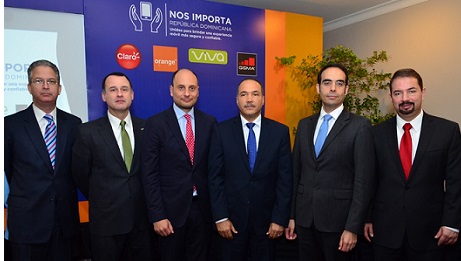As part of GSMA Latin America “We Care” campaign, mobile operators Claro, Orange and Viva will exchange stolen device information. This enables Indotel to implement the IMEI Device Check system that empower users to know if a handset was reported as stolen.
The Dominican Republic mobile operators and the GSMA today announced the launch of “We Care Dominican Republic” an initiative that seeks to provide nationwide mobile users a more secure and reliable mobile environment. With the support of the Dominican Telecommunications Institute (Indotel), the country’s mobile industry will work jointly to fight against delinquency associated with theft and handset trafficking that generate so much violence across the population.

Representatives from the GSMA, Indotel, Claro, Orange and Viva signed an agreement whereby mobile operators will connect to the GSMA stolen devices database, which allows them to exchange IMEI (International Mobile Equipment Identity) information and block devices reported as stolen on other networks.
Currently, the GSMA IMEI database or global blacklist registers 38 countries that share worldwide information of stolen headsets daily. Worldwide, there are 105 operators participating, of which 43 are from 18 Latin American countries.
According to GSMA Intelligence, total mobile connections already reached up to 10.6 million in Dominican Republic by June 2015 and mobile is the main way to access the internet for many citizens. Furthermore, the use of smartphones is increasingly growing, which are often the main targets for theft. The country now has 4.5 million smartphones connections and it is estimated that these devices will exceed 8 million by 2020 (66 per cent of penetration).
“With the growth of the Dominican mobile market, it is necessary to attack handset theft in a comprehensive way with concerted effort from all stakeholders, namely users, operators, regulators and manufacturers”, said Sebastian Cabello, Head of GSMA for Latin America. “Society as a whole must work together to stop the violence of criminals who steal mobile phones”, he added.
Additionally, sharing information will also enable mobile operators to release the GSMA IMEI Device Check service in the Dominican Republic. The system will allow citizens to check in real time if the headset that they are about to buy has been included in the global blacklist so they do not support crime.
“Thanks to the support from Indotel, we can offer this tool to mobile users in Dominican Republic, which also enables more commitment to discouraging the use of stolen mobile phones”, continued Cabello. “This tool is another example of how the public and private sectors can work together to support consumers, aiming to close the circle that brings more insecurity and to discourage black market and crime linked to this phenomenon.”
“This initiative is a sign of the commitment of INDOTEL and the sector to contribute to find solutions to mobile phones theft, an issue that impact on the safety of so many people. We hope this tool contributes to discourage illicit mobile acquisition and to end the stolen handset market. We thank GSMA for allowing us to use this key tool and everyone who has made this initiative possible, which certainly strengthens control standards and the fight against the use of stolen handsets. A lot of work remains to be done, but we are confident that working together we will achieve the best results”, said Gedeon Santos, Chairman of the Board of INDOTEL.
Engeneer Oscar Peña, Claro President, highlighted that Claro Dominicana participation in this effort with GSMA it has been is already running by its headquarters -America Movil- in its operations in over 20 countries. This is part of a strong tradition of strict law and regulation compliance, and industry best practices. Claro President said: “The contributions of the GSMA will complement the efforts initiated in 2009 and will help the work of the operators. This agreement indicates that preventive actions are taken to prevent irregularities in mobile activations”.
Likewise, Altice Hispaniola´s CEO, Abdelhakim Boubazine said: “It is a pleasure for Orange Dominicana to be part of this historic agreement. Our commitment -like the one of all the telecommunications sector- has always been to work for the welfare of our citizens. Handset theft is a scourge that transcends to other Latin American countries and that needs to be promoted globally with the common effort of the public and private sectors. In Dominican Republic there are legal mechanisms to combat this practice, both in ordinary law and in INDOTEL Telecommunications’ regulation. Since 2002, INDOTEL has worked on control parameters applying improvements that have been implemented fully by the sector. Today, with the help of GSMA’s global experience and the framework provided by our regulator, we are taking a big and very effective step in addition to the specific actions that we had been executing”.
“It is important to highlight that in VIVA -with the other operators in the sector- we comply with the procedures established in the existing legal and regulatory framework, contributing with the authorities in the effort aimed to the reduction or elimination of willful handset theft situation. To support local and regional initiatives and continue taking firm steps in the search for solutions on this important issue, we have joined today this cooperative effort to start exchanging information through GSMA’s database. This is one of the strongest tools we have available worldwide, as a result of the collaborative work of the private sector, supported by our international relations in the industry”, said Tomas Perez Ducy, CEO of Trilogy Dominican – VIVA.
The “We Care” campaign was launched by Latin American mobile operators seeking to ensure that each of its users can enjoy the benefits of mobile technology in a safe and secure environment. To achieve this, they have decided to join efforts as an industry and undertake in every country in the region through a number of commitments where mobile services can give solutions to social problems. The “We Care” campaign has been already launched in Brazil, Colombia, Costa Rica, El Salvador, Mexico and Nicaragua and will continue all along the region.